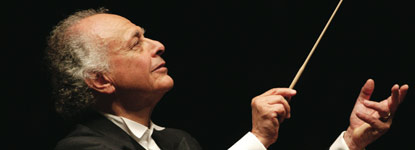 On Saturday night, Lorin Maazel, who will turn 80 in two months, returned to LA for the umpteenth time to conduct the Los Angeles Philharmonic in works by Richard Strauss and Jean Sibelius.
On Saturday night, Lorin Maazel, who will turn 80 in two months, returned to LA for the umpteenth time to conduct the Los Angeles Philharmonic in works by Richard Strauss and Jean Sibelius.
In the first half of the concert, Maazel conducted the orchestra in works by Strauss: the Suite from “Der Rosenkavalier,” “Dance of the Seven Veils” from “Salome,” and the Final Scene from that opera with soprano Nancy Gustafson.
By the smile on his face, it was clear that Maazel enjoyed conducting “Der Rosenkavalier,” and who could blame him? The music is rich in both melody and orchestration and, with the full complement of percussion instruments (including bass drum, cymbals, glockenspiel, ratchet, snare drum, tambourine, and triangle), the piece is a great opening work, especially in the acoustically sensitive Disney Hall. “Der Rosenkavalier,” as with most Strauss orchestral works, places a lot of demands on the orchestra, especially the horns, and the L.A. horn section came through with flying colors.
Next on the program was the “Dance of the Seven Veils” from Strauss’ opera, “Salome,” and then, with a brief pause to change some players and for Gustafson to enter the stage, the Final Scene from “Salome.” The orchestra played both pieces expertly, with kudos going to principal oboist Ariana Ghez and principal flutist Katherine Ransom Karoly, who, with the likely guidance of maestro Maazel, rendered the music as sensually as did Gustafson (who was dressed provocatively in a long, tight black dress with a plunging neckline). Gustafson sang her part admirably, even though it was difficult to hear her at times over the full Straussian orchestra.
The first half of the concert lasted for an hour, but it was an hour of some of Strauss’ most evocative and beautiful orchestral writing, in which he moves effortlessly and seamlessly from some of the most masculine, testosterone-driven symphonic music to the most delicate and ethereal.
Like being served one very rich dessert after another, it was difficult to switch gears to the Second Symphony by Sibelius. That difficulty, however, was quickly alleviated once the strings began the D major Allegreto that starts the first movement. By the time the symphony ended, the audience had heard perhaps the most complete and satisfying rendition of that symphony. That is not surprising because, as Maazel admitted in a recent interview in the L.A. Times, he has probably conducted the Sibelius Second Symphony 40 times in his unusually long and illustrious career. His knowledge of the symphony and his absolute control over all aspects of the performance revealed a consummate and confident conductor, which one would certainly expect given his 70 years conducting major orchestras. But, unlike other conductors of the same age or even younger, Maazel moves and conducts with the energy of a much younger man.
For all you Brucknerds, Maazel will stay in town for another week to conduct the orchestra in the herculean Symphony No. 8 in C minor by Anton Bruckner on Jan. 21, 22 and 24. For information, visit www.laphil.com.






Loved reading the review of Maazel conducting such a splendid program…wish I could have heard it in person.